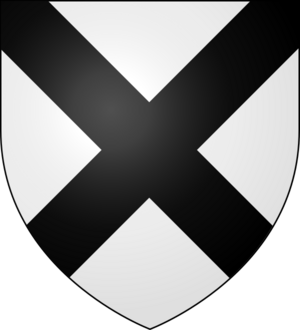Eustace de Maxwell facts for kids
Quick facts for kids Eustace de Maxwell |
|
|---|---|
| Died | 3 March 1342 Caerlaverock, Scotland |
Sir Eustace de Maxwell (died March 3, 1342) was an important Scottish noble. He lived in the 1300s and was the Lord of Caerlaverock. His life was full of changes as he lived during a time when Scotland was fighting for its independence.
Contents
Who Was Sir Eustace de Maxwell?
Eustace de Maxwell was the son of John de Maxwell, who was also the Lord of Caerlaverock. Eustace became a knight and played a big part in the history of Scotland. He was known for his changing loyalties during the Wars of Scottish Independence. These wars were a long fight between Scotland and England.
Early Life and Changing Sides
In 1312, Eustace de Maxwell was in charge of Caerlaverock Castle. At first, he supported the English king. However, he soon changed his mind and decided to support King Robert I of Scotland. King Robert I was a hero who fought for Scotland's freedom.
After Eustace switched sides, the English army tried to capture Caerlaverock Castle. They surrounded the castle and attacked it. But Eustace and his men defended it bravely. The English could not take the castle. This showed how strong Caerlaverock Castle was.
Eustace de Maxwell was also one of the important people who signed the Declaration of Arbroath. This was a famous letter sent to the Pope in 1320. It asked the Pope to recognize Scotland as an independent country. Eustace's special seal was added to this important document.
A Shifting Loyalty
Later, Eustace was investigated for being involved in a plot against the king. However, he was found innocent. After King Robert I died, Eustace's loyalty changed again. He began to support Edward Balliol. Edward Balliol was another person who wanted to be the King of Scotland. He was supported by the English.
The Battle of Dupplin Moor
Eustace de Maxwell fought in the Battle of Dupplin Moor. This battle happened in 1332. It was a big victory for Edward Balliol's side. After the battle, Eustace was present at Balliol's coronation. This was when Edward Balliol was crowned king in Scone on September 24, 1332.
Even after Edward Balliol had to leave Scotland, Eustace continued to fight alongside the English. He was still active in battles and serving the English cause.
Later Years and Legacy
In 1338, Eustace de Maxwell changed sides once more. He rebelled against the English. But King Edward III of England forgave him in 1339. This shows that Eustace was a powerful and important figure. Even the English king wanted him on his side.
Sir Eustace de Maxwell passed away at Caerlaverock on March 3, 1342. He was married to Helen, the daughter of Robert Maxwell of Pollok. They did not have any children who survived. After Eustace passed away, his brother, John Maxwell of Pencaitland, became the new Lord of Caerlaverock.
 | Jessica Watkins |
 | Robert Henry Lawrence Jr. |
 | Mae Jemison |
 | Sian Proctor |
 | Guion Bluford |


